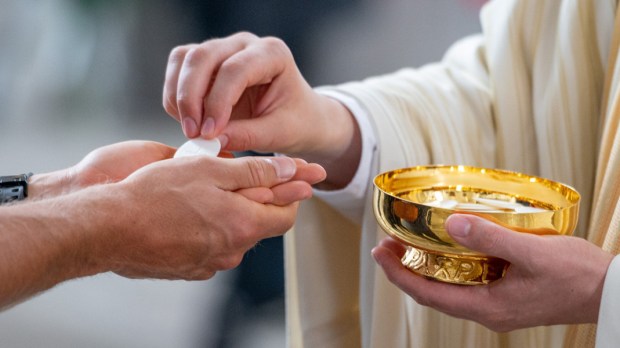“Very truly I tell you, unless you eat the flesh of the Son of Man and drink his blood, you have no life in you” (John 6:53). So should we receive Communion at every Mass?
Communion, a vital necessity
In the Our Father we ask for our daily bread, that “super essential” bread. In his speech on the Bread of life, Jesus compares the communion of his body with the manna of the desert. “The Hebrews were daily fed with manna in the desert, so that the Christian soul might daily partake of this heavenly bread and be refreshed thereby. The Holy Council wishes indeed that at each Mass the faithful who are present should take communion, not only in spiritual desire, but sacramentally,” as Pope St. Pius X decreed in the Sacra Tridentina on the frequency of communion (in 1905).
This same pope denounced the “poison of Jansenism which, under the pretext of showing due honor and reverence to the Eucharist,” had distanced so many of the faithful from receiving Communion. Yet Christ himself wants his Eucharistic body to be shared: “I have eagerly desired to eat this Passover with you before I suffer“ Luke 22:15). Receiving Communion, concluded Pope Leo XIII, is “ to comply with what Jesus truly desired in his heart,” which should be what we desire as well.
St. Gertrude of Hefta saw a nun one day abstaining from Communion and she asked God: “Why, Lord, do you allow this sister not to receive Communion?”

Read more:
Prayer to feel Jesus’s love when receiving communion
He responded: “Is it my fault if this sister so carefully covers her eyes with the veil of unworthiness that it was impossible for her to see the tenderness of my paternal love?”
Receiving Communion is not, thus, a reward for good virtue; “it is a vital necessity,” as St. Pius X states. And we might add that it is necessary to “receive the force to repress the passions, purify yourself of the minor offenses and be able to avoid the serious offenses that human frailty is exposed to.”
In depriving yourself of Communion you are also depriving humanity of this grace
The Eastern tradition speaks of “continuous” Communion: “We need to make this Eucharistic feast a continuous occupation to keep our souls from starving and becoming lethargic,” wrote St. Nicholas Cabasilas.
Nevertheless, to receive the Body of Christ, we should not be guilty of any serious sin, or be in a situation in which the Church invites us to a spiritual versus sacramental Communion. The Fathers of the Council of Trent beseeched the faithful “through the merciful tenderness of our God” to maintain themselves in a proper state to frequently receive the body of Christ through the sacrament of reconciliation and conversion of life.
Even though our Communion is very personal, it is not individual. Cardinal Journet invites us to pray thus: “My God, I want to receive you, but not only for me, but for all those in the world who are hungry for you, sometimes even without realizing it.” In depriving yourself of Communion for no important reason, you are also depriving humanity of this grace.
Father Nicolas Buttet

Read more:
Why did Jesus choose bread and wine for the Eucharist?

